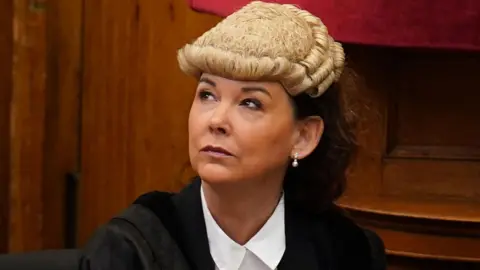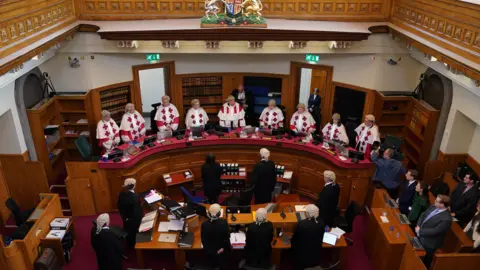
 PA Media
PA Media
A historic decision by eight Scottish judges is expected to result in more rape cases going to court.
They overturned an 87-year-old rule which limited what could be done with statements made by an alleged victim shortly after an alleged crime.
It will mean that more cases will be prosecuted, possibly resulting in more convictions, although it is as yet unclear how big the impact will be.
The Lord Advocate Dorothy Bain KC asked for the change after two sexual offence trials last year ended in acquittals.
Sandy Brindley, chief executive of Rape Crisis Scotland, said: “This is a landmark judgement that has the potential to significantly improve access to justice for rape survivors.
“This will remove a barrier for cases getting to court.”
The issue at the heart of it all is corroboration, a unique aspect of Scotland’s criminal law which requires evidence from at least two sources to prove the essential facts of a case.
Campaigners have long claimed it is an obstacle to justice because it prevents many allegations from reaching court. Supporters of corroboration argue it is an important safeguard against wrongful convictions.
The rule which has been overturned dated from the 1930s and limited what could be done with statements made by an alleged victim.
It followed a successful appeal by a man called Henry Morton, who had been convicted of indecently assaulting a woman in Glasgow in 1936.
The judges who heard the Morton case ruled that a victim’s statement made immediately after the alleged crime could only be used to show they had always been consistent in their account of what had happened.
At a hearing in June, Dorothy Bain argued such that statements should be allowed to corroborate other evidence that the crime had taken place and that the accused was the perpetrator.
Eight out of the nine judges who considered the case agreed with her.
The Lord Advocate said the decision continued an “evolution towards development of a progressive and humane justice system”.
She said: “The decisions of the appeal court have the potential to transform the way we prosecute all offences, in particular sexual offences, and I believe will improve access to justice for many more victims.
“These references have gone some way in giving victims of sexual crime the opportunity to effectively participate, but I recognise that the whole justice system has more to do.
“The Crown Office and Procurator Fiscal Service will study this judgment carefully and integrate its consequences into their continuing efforts to improve how they work.”

 Scottish Courts
Scottish Courts
Overturning the ruling should mean more cases will reach the required legal threshold to go to court, although juries will still have to be convinced beyond reasonable doubt of the accused’s guilt.
The quality of the evidence in a case will not be affected but prosecutors will be able to do more with what they have.
The Lord Advocate has often spoken of her desire to improve the legal system for victims of sexual crime.
The majority of rape cases reported to police do not result in prosecutions and of those that do, the conviction rate is significantly lower than for other offences.
For example, in 2022/23, 2,529 rapes and attempted rapes were recorded by Police Scotland.
That same year, 372 rape and attempted rape cases reached the courts. The conviction rate was 48%, compared to more than 80% for all crimes.
Speaking earlier this year, one law lecturer said overturning the Morton rule would in effect mean the end of corroboration as we have known it for close to a century.
Dr Andrew Tickell from Glasgow Caledonian University said the evidence from a single witness could be used to corroborate far more of the case.
Nine judges considered the Lord Advocate’s request because the decision in the 1930s had been made by seven of their predecessors.








